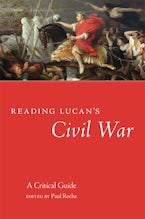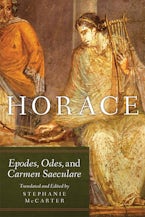FOREIGN LANGUAGE STUDY / Latin
Showing results 1-10 of 31
Filter Results OPEN +

Latin Redux
A Second-Year Grammar Review
As the first book of its kind to supplement the curriculum of intermediate students, Latin Redux fills an important niche in Latin instruction. Classroom tested by the author, the handbook complements any Latin prose or poetry readings an instructor might select. Adding to its appeal, each chapter includes a fun “Lingua Latina Ubique” (Latin Language Everywhere) section that highlights how much Latin we use every day. The volume is further enhanced by Latin-to-English and English-to-Latin glossaries and a grammatical appendix.
The Arena of Satire
Juvenal's Search for Rome
The Arena of Satire presents the satirist as flaneur traversing the streets of Rome in search of its authentic core—those distinctly Roman virtues that have disappeared amid the corruption of the age. What the vengeful, punishing satirist does to his victims, as Larmour shows, echoes what the Roman state did to outcasts and criminals in the arena of the Colosseum.
Reading Lucan’s Civil War
A Critical Guide
The contributors to this volume are all expert scholars who have published widely on Lucan’s work and Roman imperial literature. Their essays provide readers with a detailed understanding of and appreciation for the poem’s unique features. The contributors take special care to include translations of all original Latin passages and explain unfamiliar Latin and Greek terms. The volume is enhanced by a map of Lucan’s Roman world and a glossary of key terms.
Horace
Epodes, Odes, and Carmen Saeculare
Ideally suited for classroom use, in both classical literature and Latin language courses, this bilingual edition of Horace’s poetry is enhanced by an in-depth introduction, explanatory notes, reference maps, and a glossary of literary terms.
The Athlete in the Ancient Greek World
In looking at the implications of this development for athletes, whether high-performing or recreational, this erudite volume traverses such wide-ranging fields as history, literature, medicine, and sports psychology to recreate—in compelling detail—the life and lifestyle of the ancient Greek athlete.
The Attic Nights of Aulus Gellius, Second Edition
An Intermediate Reader and Grammar Review
The selections chosen for this reader touch on diverse aspects of Roman culture and can be easily understood and translated by intermediate students. For the Second Edition, Chamber added three new chapters, one of which centers on Aulus Gellius’s translation of a letter to Aristotle by Philip of Macedon announcing the birth of his son Alexander.
Gender and Sexuality in Juvenal’s Rome
Satire 2 and Satire 6
For students and scholars of gender and sexuality, these poems are crucial texts. Chiara Sulprizio’s lively translation, perfectly suited for classroom use, captures the vivid spirit of Juvenal’s poems, and her extensive notes enhance the volume’s appeal by explicating the poems from a gendered perspective.
The Psychomachia of Prudentius
Text, Commentary, and Glossary
Prudentius (b. 348 c.e.), one of the greatest Latin poets of late antiquity, was also a devoted Christian. His allegorical masterpiece, Psychomachia, combines epic language and theological speculation to offer a powerful vision of Roman and Christian triumphalism.
Communication, Love, and Death in Homer and Virgil
An Introduction
Homer’s Iliad and Odyssey and Virgil’s Aeneid are three of the most important—and influential—works of Western classical literature. Although they differ in subject matter and authorship, these epic poems share a common purpose: to tell the “deeds both of men and of the gods.” Written in an accessible style and ideally suited for classroom use, Communication, Love, and Death in Homer and Virgil offers a unique comparative analysis of these classic works.
The Satyrica of Petronius
An Intermediate Reader with Commentary and Guided Review
In The Satyrica of Petronius, Beth Severy-Hoven makes the masterpiece, with its flights of language and vision of Roman culture around the time of Nero, accessible to a new generation of students of Latin.

Latin Redux
A Second-Year Grammar Review
As the first book of its kind to supplement the curriculum of intermediate students, Latin Redux fills an important niche in Latin instruction. Classroom tested by the author, the handbook complements any Latin prose or poetry readings an instructor might select. Adding to its appeal, each chapter includes a fun “Lingua Latina Ubique” (Latin Language Everywhere) section that highlights how much Latin we use every day. The volume is further enhanced by Latin-to-English and English-to-Latin glossaries and a grammatical appendix.
The Arena of Satire
Juvenal's Search for Rome
The Arena of Satire presents the satirist as flaneur traversing the streets of Rome in search of its authentic core—those distinctly Roman virtues that have disappeared amid the corruption of the age. What the vengeful, punishing satirist does to his victims, as Larmour shows, echoes what the Roman state did to outcasts and criminals in the arena of the Colosseum.
Reading Lucan’s Civil War
A Critical Guide
The contributors to this volume are all expert scholars who have published widely on Lucan’s work and Roman imperial literature. Their essays provide readers with a detailed understanding of and appreciation for the poem’s unique features. The contributors take special care to include translations of all original Latin passages and explain unfamiliar Latin and Greek terms. The volume is enhanced by a map of Lucan’s Roman world and a glossary of key terms.
Horace
Epodes, Odes, and Carmen Saeculare
Ideally suited for classroom use, in both classical literature and Latin language courses, this bilingual edition of Horace’s poetry is enhanced by an in-depth introduction, explanatory notes, reference maps, and a glossary of literary terms.
The Athlete in the Ancient Greek World
In looking at the implications of this development for athletes, whether high-performing or recreational, this erudite volume traverses such wide-ranging fields as history, literature, medicine, and sports psychology to recreate—in compelling detail—the life and lifestyle of the ancient Greek athlete.
The Attic Nights of Aulus Gellius, Second Edition
An Intermediate Reader and Grammar Review
The selections chosen for this reader touch on diverse aspects of Roman culture and can be easily understood and translated by intermediate students. For the Second Edition, Chamber added three new chapters, one of which centers on Aulus Gellius’s translation of a letter to Aristotle by Philip of Macedon announcing the birth of his son Alexander.
Gender and Sexuality in Juvenal’s Rome
Satire 2 and Satire 6
For students and scholars of gender and sexuality, these poems are crucial texts. Chiara Sulprizio’s lively translation, perfectly suited for classroom use, captures the vivid spirit of Juvenal’s poems, and her extensive notes enhance the volume’s appeal by explicating the poems from a gendered perspective.
The Psychomachia of Prudentius
Text, Commentary, and Glossary
Prudentius (b. 348 c.e.), one of the greatest Latin poets of late antiquity, was also a devoted Christian. His allegorical masterpiece, Psychomachia, combines epic language and theological speculation to offer a powerful vision of Roman and Christian triumphalism.
Communication, Love, and Death in Homer and Virgil
An Introduction
Homer’s Iliad and Odyssey and Virgil’s Aeneid are three of the most important—and influential—works of Western classical literature. Although they differ in subject matter and authorship, these epic poems share a common purpose: to tell the “deeds both of men and of the gods.” Written in an accessible style and ideally suited for classroom use, Communication, Love, and Death in Homer and Virgil offers a unique comparative analysis of these classic works.
The Satyrica of Petronius
An Intermediate Reader with Commentary and Guided Review
In The Satyrica of Petronius, Beth Severy-Hoven makes the masterpiece, with its flights of language and vision of Roman culture around the time of Nero, accessible to a new generation of students of Latin.











